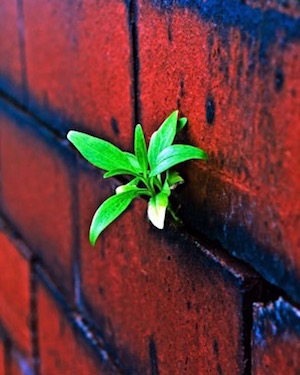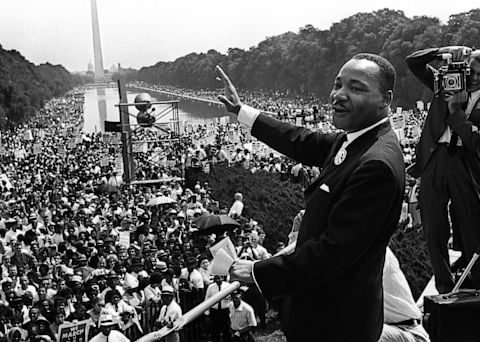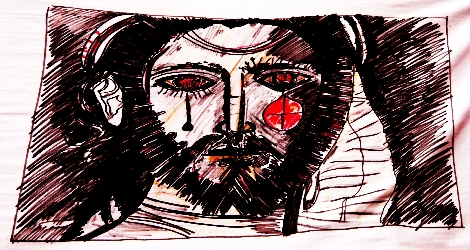Managing Editor’s Corner
August 19, 2011 by Patrick David Heery[wpcol_1half id=”” class=”” style=””]
Every second, 1 ½ acres of rainforest suffer deforestation. If destruction were to stop immediately, it would take at least 4,000 years for the ecosystem to recover.[i]
1 out of every 100 American citizens, a total of 2.4 million adults, is incarcerated in the United States.[ii]
1 in every 6 women in the U.S. will be sexually assaulted. Only 1 in every 16 rapists will ever see the inside of a jail.[iii]
Today, 22,000 children will die for no other reason than poverty.[iv]
As many as 300,000 people have died during the genocide in Darfur, Sudan, with another 2.7 million, now refugees, displaced.[v]
This is the world in which we live. And frankly, there are days when I do not want to get out of bed. Some days, I prefer the soft numbness and lethargy of sleep, television, Facebook, Google, and YouTube. I sit there, staring at the television or computer screen—because it is easier.
The statistics backfired. Instead of galvanizing my generation and others like it into action, they overwhelmed us with the staggering magnitude of the world’s suffering. Rather than face the agony of it all, we tuned out, we shut down. Powerlessness was disguised as apathy, hopelessness as hedonism.
It is easier to sleep, to party, to go online, than it is to contemplate the complexities of society’s injustices, to take action that addresses both systemic and immediate need, to develop relationships that entail trust and commitment (probably even disappointment), to care about the thousands, maybe millions, of people that—being honest—we cannot save today.
It is easier, and it is more realistic, is it not? More practical. The world’s problems are too big, too complex, to solve. Even when we try, the results often disappoint. The liberator of that post-colonial country becomes a dictator. The campaign to end worker exploitation concludes not with improved working conditions, but no working conditions at all: pure joblessness. We minister at a prison, or a homeless shelter, or a soup kitchen, but the people just keep coming—and nothing we do seems to change the systems that send them. If this is reality, and if it cannot be changed, then, yes, it is better to have a good time and not worry about any of it.
But the tactics of a generation seeking escape are not working. More and more of us are depressed, divorced, swallowing mouthfuls of anxiety medication. The news only screams louder about how the world is falling apart. Escaping to our own private lives is not any better, any simpler. An individual’s suffering, family life, quest for meaning and purpose, are just as convoluted and difficult to tackle as the economic crisis facing the United States.
Sartre was right: there is no exit. There is no escape, not in television, not in social media, not anywhere. But Sartre did not argue for apathy or surrender. Sartre was a political activist, a philosopher, a man who sought, in all of his existentialism, to claim responsibility and creative power for each moment. Sartre wrote, “In order to make myself recognized by the Other, I must risk my own life. To risk one’s life, in fact, is to reveal oneself as not-bound to the objective form or to any determined existence.”[vi]
The realization that escape is impossible is call not for despair but for engagement. If we cannot escape “choice,” if we cannot recuse our seats at the table and retreat to a private, neutral corner, then we pull up our chairs and we get down to business. We risk choosing. We lay it all on the table, life itself. All for the sake of connection and creativity, seeing and being seen by the Other across the table, bound no longer to passivity. What Sartre was describing was empowerment—humans empowered to live and die as free agents.
Sartre, of course, conceived this unbounded-ness as freedom even from a Creator: without a creator, humans are free, Sartre thought, to create themselves. But it is precisely to God, the infinite, that we shall look, because without God, we remain bound to our finitude. Without God, we are in fact not free at all and the justice we seek will be nothing more than the perpetuation of our own limitations and tyrannies. For Unbound: An Interactive Journal of Christian Social Justice, then, the unbounded-ness means freedom from an “existence determined” by human systems that exploit and oppress: the freedom to think outside of their master narratives; the freedom to bind the wounds they have inflicted; and the freedom to act as if our beings exist in intimate and inextricable relationship with the Creator—a God who is unbound to everything except God’s own nature (love, relationality) and who invites us to participate in that unbounded-ness.
Unbound is, therefore, committed to pursuing freedom for the kind of extravagant, radical social justice and community made real by a man who did in fact lay it all on the line, his life included—the God-human who embodied the reconciliation of human finitude and divine possibility—that Jesus of Nazareth who became the Other, who became one of the oppressed and told us in no uncertain terms where we might find him: on the street, in the prison, in the hospital, and among “illegal” immigrants (Mt. 25). [/wpcol_1half] [wpcol_1half_end id=”” class=”” style=””]
As the first step in that liberation, Unbound is literally unbound. This is the web, not print media, and therefore the possibilities are limited only by the extent of our imagination and faithfulness to God’s love and justice.
The content of this journal is unbound. Offering articles that provide in-depth analysis and critique, the journal is also a medium for all forms of expression and communication: art, photography, video, music, poetry, and discussion. Unbound aims to be more than a journal. It strives to be a community that operates both online and on-the-ground.
The journal is unbound by censorship. Rather than have to approve every comment before being posted, the journal invites an ethical commitment on the part of its users, and should conversation become derailed, visible moderators will help bring the discussion back to its constructive parameters.
The journal is unbound by the past. History, in its role of informing and storying our community, is an indispensable dialogue partner, but it is not our master. While bound to acknowledge and examine the church’s complicity in oppression and exclusion, we will not be bound to repeat those mistakes.
The journal is unbound by convention. Go onto the World Wide Web and you are immediately inundated with myriad websites and magazines. What is missing is a site that seamlessly interweaves community and content, broad readership and scholarship, analysis and action—a site that is both social media and an organizing tool for the radical social justice proclaimed and embodied by Jesus Christ—a site that is both journal and community. What does this journal offer? Simply put, power.
We are this journal—you and I. We are Unbound. Do not be content simply to read this journal. Help us create it.
This invitation is far more than rhetoric. In countless movies and books, a lone hero saves the days. Such focus on charismatic heroes is often the lens through which our education system and the media teach history. They tell us all about Martin Luther King Jr. But they often fail to mention all the people who worked tirelessly in and out of offices, churches, and basements; all the planning and preparation that went into Rosa Parks’ famous refusal to give up her seat on the bus; all the individuals and communities who organized so that Dr. King could have enough people at his marches, boycotts, and demonstrations. Dr. King is a personal hero of mine. He was, and remains, a great man. But he did not make the Civil Rights Movement happen. Communities of hard-working African Americans and some white folks did that, as I am sure Dr. King himself would have attested.
I do not know if history is told in this manner out of ignorance and blindness to a master narrative of individualism, or out of a deliberate attempt to prevent the real acquisition of power on the part of those who would challenge the status quo. After all, as long as we do not properly understand how real change occurs, nothing will change.
If the Civil Rights Movement had simply been a one-man show, real transformation would not have occurred, for when a leader leads exclusively from on high, when a movement is nothing more than a personality-cult, the result is either failure or the mere perpetuation of unequal power structures. In other words, we cannot “give” liberation and power. What we can do is work together to realize our common liberation and power. The distinction is between paternalism and mutuality.
That is why we need you, why we need everyone, participating. In our attempt to rectify injustice, we cannot perpetuate the very social patterns that forged those injustices in the first place. At this table, we need to risk demonstrating an alternative existence. It has to be all of us, or none of us.
Unbound to an existence determined by this world’s powers and principalities, binding wounds and unbinding chains, we are Unbound.
A recent graduate of Princeton Theological Seminary with a Master’s of Divinity, Patrick is a candidate for ordination in the Presbyterian Church (U.S.A.). Patrick grew up in Cincinnati, Ohio, as the son of two public school teachers; earned bachelor’s degrees in English and Classics from Ohio University; and is an Eagle Scout. Patrick has ministered in the areas of hospital and prison chaplaincy, the intersection of worship and mission, community organizing, environmental sustainability, immigrant detention, the peace movement, and LGBTQQI and women’s equality. He loves nature, hiking, writing, and philosophy. Banner graphic by Sigurd Decroos.Notes
[i] William F. Laurance, “Reflections on the Tropical Deforestation Crisis,” Biological Conservation 91 (1999) 109-117, http://studentresearch.wcp.muohio.edu/BiogeogDiversityDisturbance/ReflectionsDeforestCrisis.pdf. Catherine Brahic, “How Long Does It Take a Rainforest To Regenerate?” New Scientist (June 11, 2008), http://www.newscientist.com/article/dn14112-how-long-does-it-take-a-rainforest-to-regenerate.html.
[ii] Mark Taylor. The Executed God: The Way of the Cross in Lockdown America (Augsburg Fortress Press, 2001).
[iii] RAINN: Rape, Abuse & Incest National Network, “Statistics,” http://www.rainn.org/statistics.
[iv] UNICEF United States Fund, http://www.unicefusa.org/.
[v] BBC News, “Q&A: Sudan’s Darfur Conflict,” (Feb 23, 2010), http://news.bbc.co.uk/2/hi/africa/3496731.stm.
[vi] Jean-Paul Sartre, Being and Nothingness, Hazel E. Barnes tr. (New York: Gallimard, 1943, 1956, 1984), 237. Italics mine.
[/wpcol_1half_end]





Unbound Social